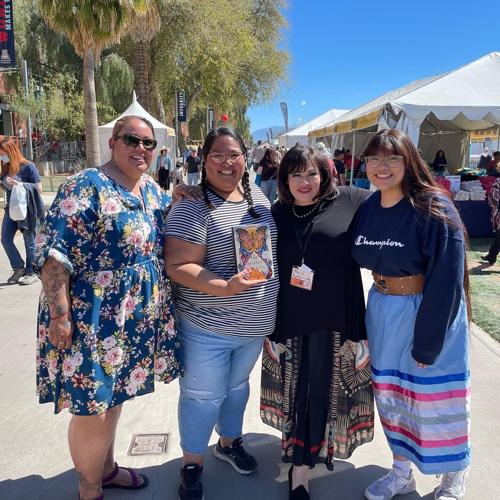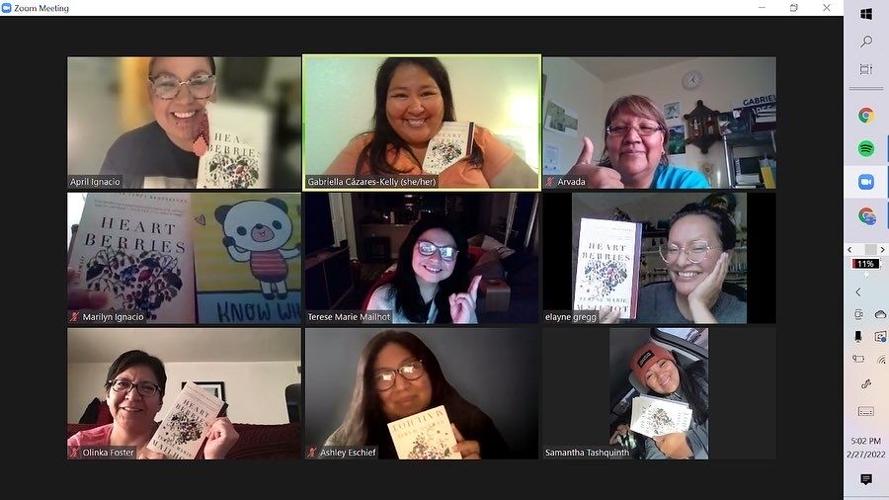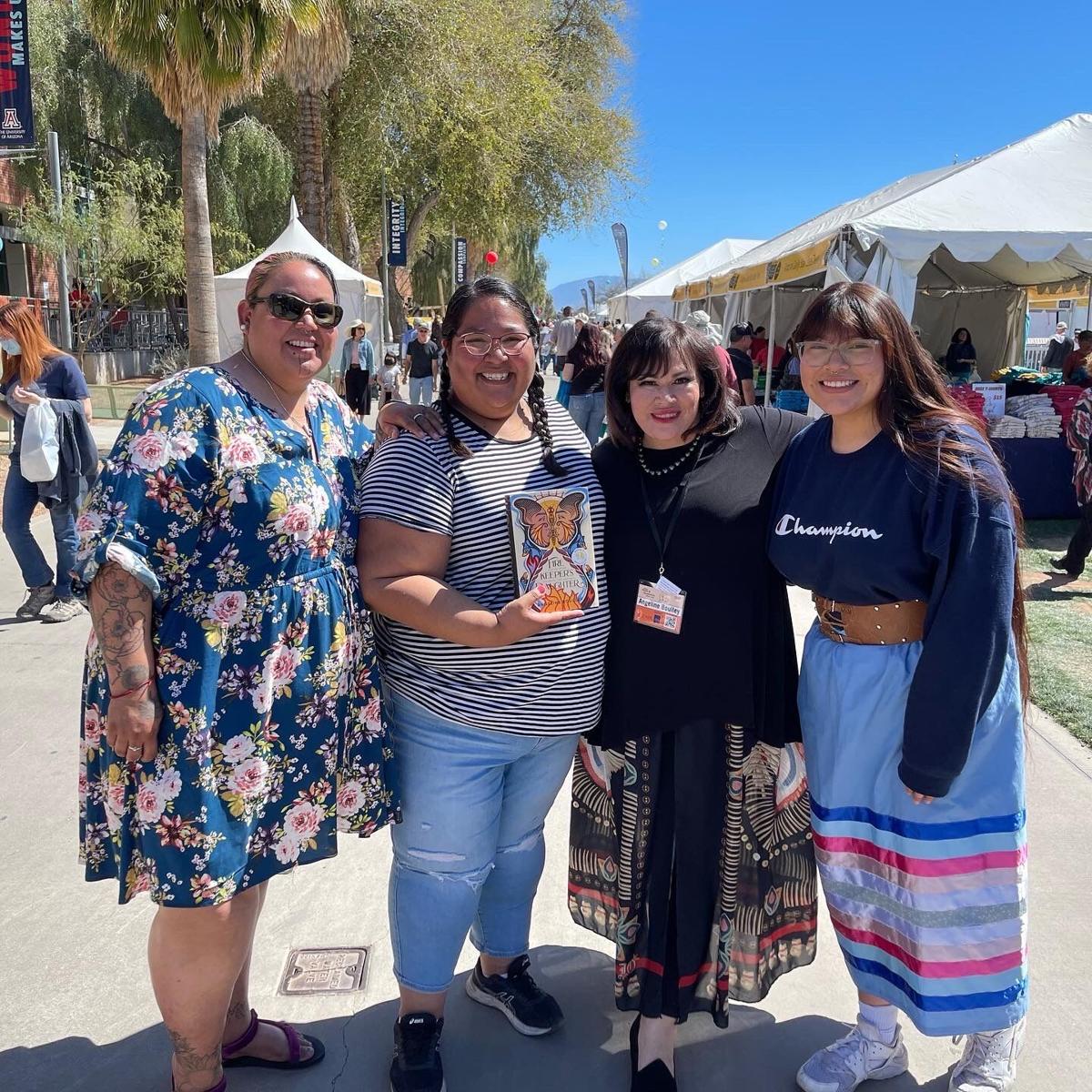April Ignacio has been busy over the last few years, to say the least.
She runs the grassroots organization Indivisible Tohono to help raise awareness about state and federal legislation affecting her home, the Tohono O’odham Nation and the 21 other federally recognized Native tribes in Arizona.
She was appointed by Arizona Gov. Doug Ducey to sit on a study committee for Missing and Murdered Indigenous Women and Girls (MMIWG) after he signed HB 2570 into law in 2019.
She’s a student at the University of Arizona, a mother to six children and a lover of books written by Native American and Indigenous authors.
But all of her endeavors are tied together with a common thread: a passion for her community and all of its members.
This same passion led Ignacio to one of her latest ventures, founding the Rez Girls Book Club last year. In this monthly online book club, Native women (and a few men) gather in a safe environment to discuss literature composed by Native and Indigenous individuals.
The goal of the book club is to help provide exposure to Native and Indigenous authors and their work.
“When I'm reading Native authors and Indigenous writers, I can see myself in those stories,” Ignacio says. “Those stories are about me, those stories are about my communities and the things that happen in my communities. And so I think that when people can see themselves in the stories, that exposure helps them see the world.”
It’s a lovely day to read Indigenous literature
Every Sunday book club meeting starts the same way, with what Ignacio calls a “Sunday song.” At 2:58 p.m., she hits play on Bill Withers’ 1977 hit song “Lovely Day” as attendees trickle into the Zoom meeting. Ignacio chose the song by Withers because it was her 16-year-old son’s favorite song when he was a kid.
She says the song is a “well wish” for everyone to have a “good day, good meeting and good week.”
By the time the song finishes at 3:04 p.m., Ignacio says, the club jumps into their meeting and begins discussing the month’s literature.
“(During) the first 15 minutes of our book club, we talk about the book and just being able to see people's faces and (hear) them talk about the one thing that they loved and the one question they have, that's like my favorite part,” she says. “Listening to everybody passionately talk about this piece of art. It's so emotional for me because we're all on the same page.”
Throughout the club’s first year, Ignacio reached out to each month’s selected author and invited them to stop by the monthly book club meeting. She says almost every author accepted the invitation and came to chat with the group.

A Zoom screenshot of the Rez Girls Book Club meeting with Terese Mailhot on Sunday, Feb. 27. The group discussed Mailhot's book "Heart Berries: A Memoir."
One of those authors was Terese Mailhot, the New York Times bestselling author of “Heart Berries: A Memoir” and creative writing professor at Purdue University, who ended up chatting with the book club for over two hours.
“We were talking about the book and the more we kept talking, it felt like I was talking to friends I knew,” Mailhot says. “And I think it's because, you know, with a group of predominantly Native women, it's a lot of fun to talk to people who get the content and get the work and also have questions about survival and about recovering and healing and trauma. It was really cool to talk to them,” she says, adding that she hopes more Indigenous book clubs will pop up in the future so communities can find each other more easily.
The Rez Girls Book Club has already read and discussed five books this year. Ignacio’s goal is to have the book club finish 18 books by the end of 2022.
“The greatest thing about this is being able to create a dialogue about Native literature and my community has been supportive, so it's like a blessing, it really is,” Ignacio says. “They call it magic and, you know, I feel like it's magic because we're talking about Native authors, great Native authors. We're talking about colorism, we're talking about racism, we're talking about colonization and we don't (all) know each other, you know, and so creating a safe online space has been interesting to navigate through.”
Ignacio says the book club originated last year when Arizona State University, a partner in the MMIWG study committee, received a large National Endowment for the Arts (NEA) grant for the school's Virginia G. Piper Center for Creative Writing, which was part of the NEA’s Big Read program. The program is "designed to broaden our understanding of our world, our communities and ourselves through the joy of sharing a good book," the website says.
As part of the grant, nine copies of the book “The Round House” by Louise Erdrich were provided to some of the MMIWG committee members.
But when the committee members didn’t have time to read the books, Ignacio thought, “it'd be really cool if we had a book club.”

April Ignacio, the founder of the Rez Girls Book Club, is one of four Democratic candidates running in the July 30 primary election for the District 3 Board of Supervisors seat. Ignacio has worked the Tohono O’odham Ki:Ki Association, the Nation’s tribal housing organization, since 2011.
With the help of NEA grants that the creative writing center was then able to distribute to other organizations, Ignacio has managed to keep the club supplied with books for their monthly meetings. For those who are unable to purchase books, she often buys them herself if she can.
The Rez Girls Book Club celebrated its first anniversary in February and within the last year, Ignacio says the book club has “just sort of snowballed into this magic.”
On average, the club hosts between six and 16 members from across the country, including North Dakota, New Mexico, Colorado, Minnesota and, of course, Arizona. Pima County Recorder Gabriella Cázares-Kelly, who is one of Ignacio’s close friends, is always in attendance.
Ignacio also recently created an Instagram account to help keep the book club members up to date with the month’s current book event and the occasional community event.
Before the Tucson Festival of Books rolled around this past March, Ignacio says she went through the event’s entire list of authors to find Native writers who would be in attendance. She then spent more than three hours creating Instagram content for the club’s 300-plus followers because she wanted them to have the chance to see the authors and meet them at the festival.
Whether Ignacio is spending time making Instagram content, securing funding from the Virginia G. Piper Center for Creative Writing NEA grant or purchasing and mailing out the remaining needed books, she says it’s all an investment in her community.
‘A shot in the dark’
But facilitating a book club with no plan for long-term funding makes Ignacio nervous, she says.
“There's a lot of unknowns that are out of my hands... Every month I'm having to hustle to get these books for my community, but I would do it, you know what I mean, I would do it,” she says. “And it just makes me nervous to (possibly) say like, ‘Oh, you're gonna have to buy your own book and I'm sorry.’ Like, that's the part that makes me nervous because a lot of people can't participate in book clubs because they can't purchase books. And like I said, that should be the last thing that they're worried about is how to get a book.”
On top of worrying about obtaining books, Ignacio and the book club members continue to deal with the repercussions of the COVID-19 pandemic in their areas. The pandemic struck fast and hard against Native and Indigenous nations across the United States.
By Dec. 29, 2021, a total of 2,491 COVID-19 cases were reported by Tohono O'odham Nation Health Care. There are currently around 28,000 Tohono O'odham members in Southwestern Arizona, according to the Tohono O’odham Nation’s website.
The pandemic led the Tohono O’odham Nation to shut down all tribal facilities, including their libraries.
In Ignacio’s hometown of Sells, Arizona, the Venito Garcia Library has remained closed throughout the pandemic, making the area’s accessibility to books and computers with internet almost nonexistent.
It’s important to note that although the libraries located on the Tohono O’odham reservation are housed in Pima County, they are not Pima County-affiliated libraries and mostly rely on donations to stay afloat, according to Ignacio.
“They (the libraries) did do a free book giveaway,” Ignacio says. “And so all the other libraries that are getting rid of their books, we get those books. There's nothing wrong with that. I have no problem with that. But we don't have access to the 2021 or 2022 reads, we get access to, like, the 2002 reads and there's nothing wrong with that. But this goes back to, like, having access to literature. We’re 10 years behind here.”
Access to reading materials on the reservation has remained difficult for years due to location, a lack of bookstores, the recent closures of public libraries and access to the internet.
“So the access to literary content is very, very small, like, it's almost second to none. On my reservation, we don't even get the local newspaper,” she says, referring to the Arizona Daily Star.
“So, you know, because of where we live, it's already particularly hard to find good books (and other reading materials).”
Because of the lack of accessibility and internet connectivity, running a book club is a “shot in the dark, so to speak,” Ignacio says, adding, “it's really surprising to me how long we've actually lasted, because of the barriers, because of ‘life happens,’ you know, and each month, I'm holding my breath, to see if we're gonna get books.”
‘It feels like magic’
With such a positive reception from the Tohono O’odham community and beyond, Ignacio plans to look into fundraising and other options to buy books for the Rez Girls and continue the club’s magic.
“I think that there is definitely a possibility to grow, it just comes down to time and money, both of which I don't have,” Ignacio says. “So keeping it small, it's beneficial for me, but I think that, if we're going to continue, we're going to grow and so that means I would really need to explore figuring out how to fundraise to purchase books... I think that it's something that our community wants, it’s just figuring out how to make sure we get our meat hooks in these books. You know, that's what it comes down to, is how do we get these books?”
Although she is the one-woman show behind making the book club operational, Ignacio insists she’s just the facilitator.
“I don't make the book club,” she says. “The community makes the book club. You know, like I'm just there to facilitate it. And I just want to make sure that my people are in a safe space where they feel like they can digest this English writing and try to relate to it and digest why they're feeling what they feel... But, we have a lot of fun and we laugh quite a bit. And because our cultures are so similar, our belief systems are so similar, we don't have to explain them. So, it feels like magic, it feels like magic.”
Keep up with the Rez Girls Book Club on Instagram.







